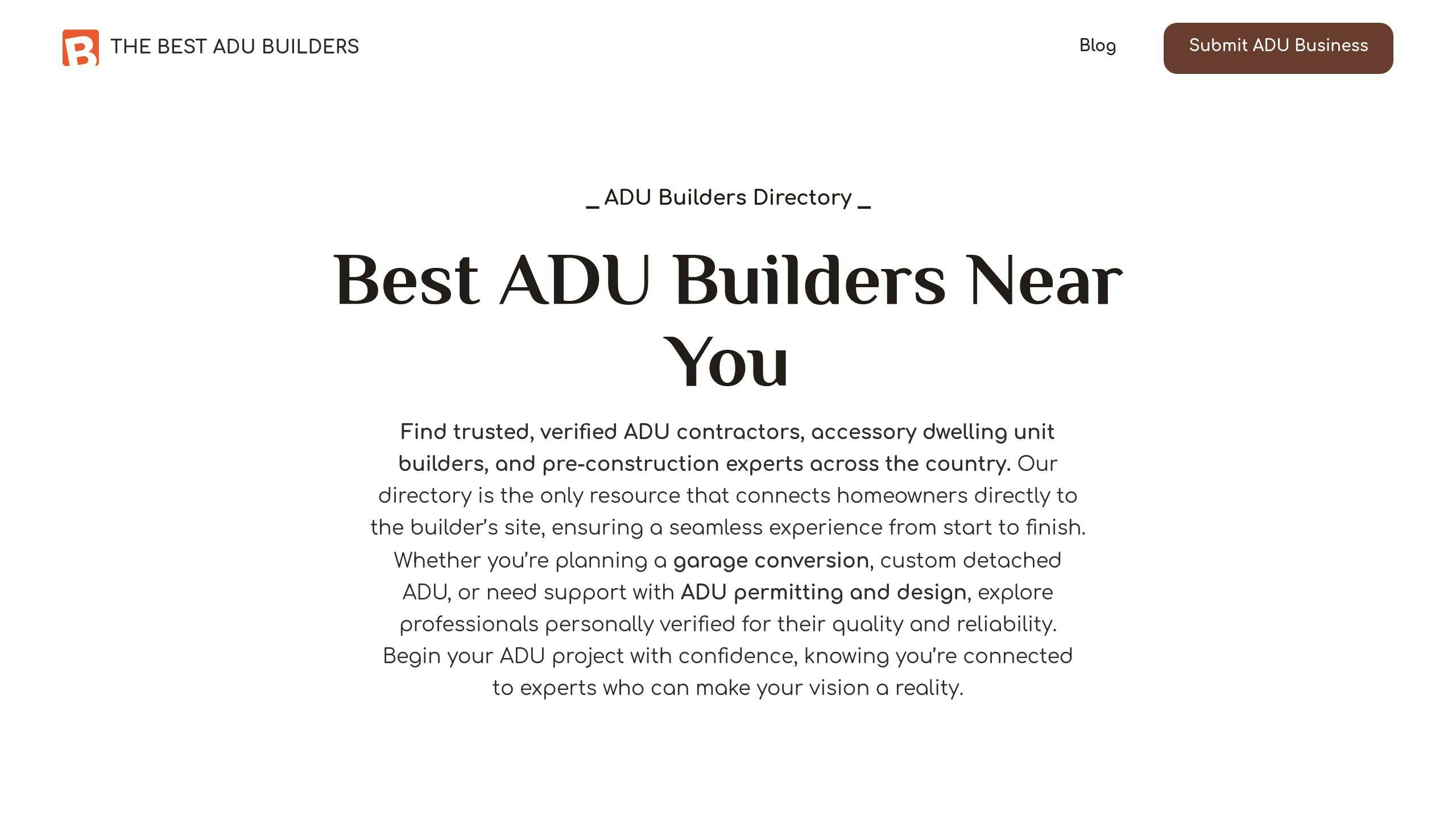Looking to build an Accessory Dwelling Unit (ADU)? Here's how to hire the right builder and avoid costly mistakes:
-
Check qualifications:
- Valid contractor's license
- General liability insurance
- ADU-specific experience
- Knowledge of local ADU laws
-
Verify quality:
- Review past projects
- Check references
- Visit completed ADUs
-
Protect your investment:
- Get detailed contracts
- Set up a structured payment schedule
- Plan for extra costs (10-15% buffer)
-
Communicate effectively:
- Regular progress updates
- Clear decision-making process
- Document everything
-
Watch for red flags:
- Huge upfront payments
- Vague contracts
- Pushy sales tactics
Remember: A good ADU builder will have experience, proper credentials, clear communication, and fair pricing. Don't rush - take time to find the right fit for your project.
| Good Signs | Warning Signs |
|---|---|
| Fair deposit (10-25%) | Huge upfront payment |
| Detailed contracts | Vague agreements |
| Valid licenses and insurance | No proper credentials |
| Shares references and portfolio | No references |
| Handles all permits | Avoids permit process |
| Clear communication | Poor responsiveness |
By following these guidelines, you'll be better equipped to choose a reliable ADU builder and avoid common pitfalls in your project.
Related video from YouTube
Required Builder Qualifications
Hiring the right ADU builder is key to avoiding headaches and extra costs. Here's what to look for:
Licenses and Certifications
In California, any contractor working on a $500+ project needs a valid license from the Contractors State License Board (CSLB). For ADUs, builders typically need:
- Class B General Building Contractor license
- General liability insurance
- Surety bond
To check a contractor's license, call CSLB at (800) 321-2752 or visit their website.
"A lot of people gave too much money up front and they gave up too much money without the products being delivered." - Katherine White, CSLB
Protect yourself: Always verify the license and set up a structured payment schedule.
Past ADU Projects
Experience is crucial. Here's how to check a builder's track record:
Ask for references from previous ADU clients. Visit completed ADUs and ongoing sites. Check their permit history for ADU projects.
"The contractor they selected turned the floor plan 90 degrees, which removed some space the parents had to navigate through the backyard in a wheelchair." - Erin, real estate enthusiast
This story shows why you need builders with solid ADU experience.
Building Code Knowledge
ADU rules can be tricky and change by location. Your builder should know:
- State ADU laws
- Local zoning rules and building codes
- ADU-specific requirements (like minimum size and utility connections)
California's ADU rules have gotten more lenient, with permit applications up 60% in 2023 compared to 2022. But local areas might have extra rules.
To make sure your builder is in the know, ask about:
Their recent ADU projects, how they stay updated on rule changes, and how they handle permits and inspections.
How to Check Builder Quality
Picking the right ADU builder is key. Here's how to make sure you're getting a good one:
Looking at Past Work
Check out what the builder has done before. Ask them to show you their finished ADUs. Look for:
- How well they're designed
- Different types and sizes of ADUs
- Smart ways they've used space
Element Homes, for example, has some cool ADUs in California:
"We've built a 510 sq ft ADU in Sacramento with 1 bedroom, a 560 sq ft 2-bedroom in Pacifica, and a 747 sq ft 2-bedroom in Petaluma. Each one has its own unique features."
Checking References
Don't be shy - ask for references and call them up. When you talk to past clients, ask:
- How did the builder communicate?
- Did they finish on time and stick to the budget?
- How did they handle problems?
Here's a quick guide for reference checks:
| Ask About | Why It Matters |
|---|---|
| Cost estimate accuracy | Shows if they're good with money |
| Subcontractor punctuality | Tells you about their management |
| Problem-solving | How they handle hiccups |
| Would they use them again | Overall happiness with the work |
Visiting Finished ADUs
Nothing beats seeing the work in person. When you visit, check out:
- The quality of the finishes
- How well the space works
- Little details that show good craftsmanship
One happy homeowner said:
"Our ADU by The Comito Team was amazing. We actually enjoyed the building process, which is pretty rare!"
Using TheBestADUBuilders.com

Online tools can help too. TheBestADUBuilders.com is a good resource. It offers:
- A list of checked-out ADU builders
- A way to submit your project and get matched with builders
- Detailed info and reviews on builders
A good builder should:
- Have the right licenses and insurance
- Be part of local building groups
- Know the local ADU rules inside and out
Protecting Your Money and Agreement
Building an ADU? You need to protect your cash and get a solid deal in writing. Here's how:
Project Changes and Costs
Construction changes can hit your wallet hard. Here's how to stay on top of it:
- Get EVERYTHING in writing
- Agree on costs BEFORE work starts
- Use a change order system
Set aside 10-15% of your budget for surprises. Trust me, you'll thank yourself later.
Payment Timeline
A clear payment schedule keeps everyone honest. Check out this example for a $55,000 ADU:
| Stage | Payment | Percentage |
|---|---|---|
| Initial (materials) | $7,536 | 13.7% |
| Footings inspected | $15,100 | 27.5% |
| Framing completed | $15,100 | 27.5% |
| Drywall inspected | $10,100 | 18.4% |
| Cabinets installed | $5,000 | 9.1% |
| Project completion | $2,500 | 4.5% |
Here's the golden rule: NEVER pay more than 10% upfront. It's your safety net if things go south.
Price Breakdown
Demand a detailed cost breakdown. You want to see:
- Labor costs
- Materials
- Permits and fees
- Utility connections
- Finishes and fixtures
Pro tip: Ask for an "allowance" for each finish item. Set a budget for those fancy bathroom faucets or that perfect tile.
Extra Cost Planning
Construction surprises happen. Be ready:
- Pad your budget by 10-15%
- Talk about potential issues upfront (weird soil? old utilities?)
- Consider a contingency fund agreement with your builder
"To avoid potential risks and scams, it's essential to be vigilant and informed." - Thomas Custom Builders
Bottom line: A solid contract is your best friend. The California ADU Construction Agreement ($997) is tailor-made for ADU projects and keeps you on the right side of state laws.
sbb-itb-4e754d1
Project Planning Steps
Planning your ADU project is key to avoiding headaches. Here's how to do it right:
Project Schedule
A solid timeline keeps your ADU build on track:
- Team up with your builder for a realistic schedule
- Include major milestones and deadlines
- Plan for potential setbacks like weather or permit delays
"The City of Los Angeles took about 30 days to review my plans. After a few minor tweaks, I had permits in hand and was ready to build." - ADU homeowner, Los Angeles
Pro tip: Add a 10-15% time cushion. You'll thank yourself later.
Utility Setup
Don't overlook utilities. Here's what to think about:
| Utility | Key Questions | Typical Cost |
|---|---|---|
| Electrical | New panel needed? | $1,000 - $5,000 |
| Plumbing | Connect to main house? | $2,000 - $10,000 |
| Water | Separate meter? | $1,500 - $5,000 |
| Gas | All-electric or gas? | $500 - $2,000 |
| Internet | New service or extension? | $500 - $2,000 |
Heads up: Utility work might mean digging trenches. Plan smart to minimize mess and costs.
Design Checks
Before you finalize your ADU design:
- Check local zoning laws and building codes
- Make sure it fits your needs (like wheelchair access)
- Look at the layout for smart space use
- Check if it matches your main house's style
"The contractor flipped the floor plan 90 degrees. This cut down on wheelchair-accessible space in the backyard." - Erin, real estate buff
This shows why design reviews matter, especially for specific needs like accessibility.
Getting Permits
Permits can be tricky. Here's how to handle them:
- Know your local ADU laws
- Get pro help to prepare complete plans
- Submit to your city's building department
- Be ready for possible revisions
In California, ADU permits are getting easier. They jumped 60% from 2022 to 2023.
Budget tip: Set aside 1-2% of your ADU's value for permit costs.
Setting Up Good Communication
Good communication can make or break your ADU project. Here's how to keep everyone in sync:
Progress Updates
Stay in the loop with regular updates:
| Update Type | Frequency | Purpose |
|---|---|---|
| Quick check-ins | Daily | Status and urgent issues |
| Detailed reports | Weekly | Progress, upcoming tasks, potential problems |
| Site visits | Bi-weekly | On-site inspection and talks |
Greg Popovich from Goldbar Builders puts it this way:
"Clients think, well, it's just moving a wall. But it's much more than that. Now we're bringing in five or six different trades in order to remove the old wall and rebuild the closet."
This shows why frequent updates matter. Even small changes can snowball into big impacts.
Making Choices
Set up a clear decision-making process:
- Pick one person for final decisions (usually you, the homeowner)
- Set deadlines for important choices to avoid holdups
- Use a shared online tool to track decisions and changes
Pro tip: Keep a decision log. It's a lifesaver when you need to remember who decided what and when.
Keeping Records
Document EVERYTHING:
- Use a project management tool like Buildertrend
- Take daily progress photos
- Save all project-related emails and texts
Leah Kabli from TheBestADUBuilders.com suggests:
"Keep a digital folder for each aspect of your ADU project. This makes it easy to reference decisions and track changes over time."
Fixing Problems
Have a game plan for when things go wrong:
1. Spot the issue: What's the problem?
2. Check the damage: How does it affect time and money?
3. Brainstorm fixes: Work with your builder on solutions
4. Pick a plan: Make a choice and write it down
5. Fix and follow up: Make sure the problem's solved for good
Good Signs and Warning Signs
Hiring an ADU builder? Here's what to look for - and what to avoid.
Builder Warning Signs vs Good Signs
| Warning Signs | Good Signs |
|---|---|
| Huge upfront payment | Fair deposit (10-25%) |
| Vague contracts | Detailed contracts |
| No license or insurance | Valid licenses and insurance |
| Pushy sales tactics | Gives you time to decide |
| Suspiciously cheap | Realistic pricing |
| No references | Shares references and portfolio |
| Dodges permits | Handles all permits |
| Ghost mode | Clear communication |
Red Flags to Watch Out For
1. Too-Good-To-Be-True Prices
If a quote seems WAY lower than others, be careful. In March 2023, an LA homeowner got burned by a lowball bid. The catch? It left out crucial stuff like foundation work and utilities.
2. Pressure to Sign NOW
Run from builders who act like used car salesmen. As GreatBuildz puts it:
"Some contractors use high pressure sales tactics to try and win your business."
These guys care more about closing deals than doing good work.
3. ADU Newbies
ADUs aren't just mini-houses. They need special know-how. Symbium warns:
"A contractor without ADU experience could cause costly problems. Avoid these issues by ensuring that your contractor has a reputable portfolio of similar projects."
Good Signs to Look For
1. Clear Pricing
The best builders break it all down for you. Element Homes, for example, shows you exactly what you're paying for - labor, materials, permits, even finish allowances.
2. They Actually Talk to You
Good communication is key. Check out this happy client of The Comito Team:
"Our ADU by The Comito Team was amazing. We actually enjoyed the building process, which is pretty rare!"
3. Legit Credentials
Use sites like TheBestADUBuilders.com to find pre-vetted pros. You can check their creds and read real client reviews.
4. Solid Contract and Design Process
Look for builders who offer:
- Detailed contracts that spell everything out
- A design process that listens to your ideas
- 3D renderings or plans before they start building
5. They Know the ADU Rules
California's ADU laws have gotten way more relaxed. Permit applications jumped 60% from 2022 to 2023. A good builder will know these changes inside and out.
What to Include in Your Contract
A solid contract protects you when hiring an ADU builder. Here's what you need:
Scope of Work
Define what the builder will and won't do. Be specific about:
- Materials
- Design details
- Utility connections
- Permits and inspections
Payment Schedule
Here's a typical payment structure:
| Stage | Payment | Percentage |
|---|---|---|
| Initial deposit | $5,500 | 10% |
| Foundation complete | $11,000 | 20% |
| Framing complete | $11,000 | 20% |
| Rough-ins complete | $11,000 | 20% |
| Drywall complete | $8,250 | 15% |
| Final completion | $8,250 | 15% |
Don't pay more than 10% upfront. In California, it's illegal for contractors to ask for more than 10% or $1,000 (whichever is less) as an initial deposit.
Change Order Process
Specify how changes will be handled:
- Who can request changes
- How changes will be priced
- Approval process
Timeline and Milestones
Break the project into phases with completion dates. For example:
- Design approval: 2 weeks
- Permit acquisition: 4-6 weeks
- Foundation work: 2 weeks
- Framing: 3 weeks
- Rough-ins: 2 weeks
- Finishing work: 4 weeks
Warranties and Guarantees
State what's covered and for how long:
- 1 year for workmanship
- 2 years for systems (plumbing, electrical, HVAC)
- 10 years for structural elements
Dispute Resolution
Include how disagreements will be handled. Many contracts specify mediation before arbitration or litigation.
Insurance and Licensing
The contract should require the builder to:
- Keep valid licenses throughout the project
- Carry general liability insurance (at least $1 million)
- Provide workers' compensation coverage
Termination Clause
Specify how either party can end the contract:
- Notice period required
- Payments for work completed
- Return of materials
A well-crafted contract protects both you and the builder. Leah Kabli from TheBestADUBuilders.com says:
"Always have a local attorney review your contract to ensure it complies with state and local regulations. This small investment can save you thousands in potential disputes later."
Summary
Picking the right ADU builder can make or break your project. Here's what you need to know:
| Aspect | Why It Matters |
|---|---|
| Experience | Ensures ADU-specific know-how and quality work |
| Licensing | Protects you legally and financially |
| Communication | Keeps you in the loop and avoids mix-ups |
| Contract | Spells out the what, when, and how much |
| References | Shows you the builder's track record |
A few key things to keep in mind:
Double-check credentials. Always verify licenses and insurance. In California, it's against the law for contractors to ask for more than 10% or $1,000 upfront (whichever is less).
Get detailed quotes. Watch out for bids that seem too good to be true. A recent case in Los Angeles showed how a lowball quote left out crucial elements like foundation work and utilities.
Budget for surprises. Set aside 10-15% extra for unexpected costs. Use a change order system to handle any tweaks along the way.
Keep the lines open. Regular updates are key. As Greg Popovich from Goldbar Builders puts it:
"Clients think, well, it's just moving a wall. But it's much more than that. Now we're bringing in five or six different trades in order to remove the old wall and rebuild the closet."
Know the rules. ADU regulations aren't one-size-fits-all. In California, permit applications shot up 60% from 2022 to 2023 thanks to more relaxed laws.

